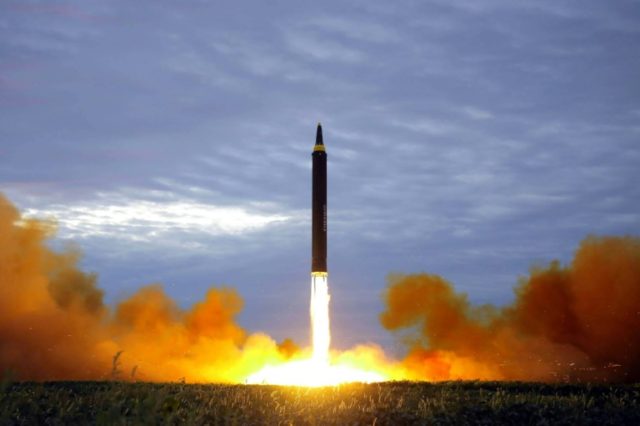A study published Monday by Stanford University’s Center for International Security and Cooperation (CISAC) estimated that North Korea produced enough fissile material last year to construct seven more nuclear bombs, even as it was negotiating denuclearization with the United States.
The study nonetheless concluded North Korea has slowed or even partially reversed its escalation of nuclear capabilities and diplomacy has ameliorated the threat posed by Pyongyang.
The CISAC publication is an update to an in-depth report produced in May 2018, adjusted to reflect both the latest surveillance information about North Korea’s nuclear program and the results of diplomacy over the past year.
On the surveillance front, the authors pointed to open-source satellite imagery of the Yongbyon reactor complex that suggests enough plutonium and enriched uranium was produced since 2017 to construct five to seven nuclear warheads. North Korea’s stockpile currently includes an estimated 30 nuclear weapons.
There is no conclusive evidence that North Korea constructed any new warheads with the additional fissile material. The overall tenor of the update was guardedly optimistic about denuclearization, since North Korea significantly slowed down or reversed the development of missiles that could reliably deliver its warheads across intercontinental distances.
“The North did continue to produce fissile materials. But it took the remarkable step to end nuclear testing and long-range missile testing at a time during which North Korea had been rapidly increasing the sophistication of its nuclear weapons and missiles and their destructive power and reach,” CISAC Senior Fellow Siegfried Hecker, former director of the Los Alamos National Laboratory, said in a Q&A session about the updated report.
“The diplomatic initiatives have greatly reduced the threat,” said Hecker. “Our study, which looks at the details of how the capabilities have changed in 2018, concludes that the rapid escalation of overall capabilities in 2017 and prior years was halted and in some cases rolled back.”
Hecker judged that Western media reports have underestimated the significance of the denuclearization actions North Korea has taken but cautioned everything so far has been a prelude to the truly vital negotiations about to begin.
The great diplomatic paradox is that North Korea has only come so far because the Trump administration staunchly insisted on complete denuclearization before it receives any rewards, but Pyongyang has repeatedly stated it will go no further until it receives concessions such as sanctions relief and American support for a Korean War peace treaty.
Hecker suggested goosing the North Koreans down the denuclearization path by helping them convert their nuclear and missile programs to productive civilian energy and space programs. Such a strategy could put money in Pyongyang’s coffers, make denuclearization look like a positive step forward instead of capitulation to American demands, and make verification easier by putting Western engineers on the ground in North Korea.
CISAC analysts spoke favorably of meeting with U.S. special envoy to North Korea Stephen Biegun, who emerged from a meeting with South Korean parliamentarians on Tuesday to declare, “It is a long road to normalizing ties with North Korea, signing a peace treaty, and establishing the foundation for economic prosperity on the Korean Peninsula.”
Biegun said the United States is committed to seeing that long process through.
“I hope North Korea makes the right choice and I believe it can,” he said.
Biegun reportedly told his South Korean visitors it will be “difficult to resolve all the tricky issues” in time to hold the second summit between President Donald Trump and North Korean dictator Kim Jong-un on schedule at the end of February, but it can be done if the North Koreans agree to a timeline for denuclearization.
Although it did not receive a great deal of attention from U.S. media, North Korea has tentatively agreed to allow international inspectors at its nuclear and missile sites. The speed with which denuclearization must be accomplished, and the point at which concessions will be made by the United States to reflect progress made by North Korea, are evidently the major sticking points in negotiations as the Trump-Kim summit approaches.
Biegun said in January that President Trump expects “significant and verifiable progress on denuclearization” after his second summit with Kim, who will be expected to take “actions that are bold and real.”

COMMENTS
Please let us know if you're having issues with commenting.